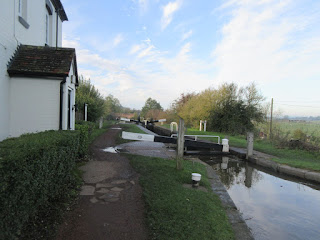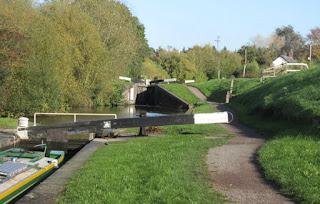Another brilliant late October day - chilly at first but not impossible. We set off just before 9 - the only question was just how far could we get today with just the two of us? We have made it all the way to Droitwich before but that was with the assistance of Andrew. A crew of three can work two or three minutes faster per lock.
With nothing but lock after lock there is not too much to put in this blog but here is a series of random photos, all of which ask the question "What is there not to like?"
Oh, look! There were two volunteer lock keepers just below - would they come to our assistance? Hopes faded when we were firmly told that they were helping a single hander and rules meant that had to have two of them in such cases! It looked very much as if the boater had a very easy ride as the volunteers did all of the work . We saw another volunteer a few locks later but he was already working another boat up the flight. Now we don't want to carp as we are grateful for volunteers when they are available but have no expectations about then being there. We also realise that their base (an hence start point) is some way down the flight and they tend to work boats uphill but actually it is going downhill that their help is most useful. (Shutting the two bottom gates is the more time consuming for the steerer to do especially those who have given up stepping across the gap between the gates)
We guess that this unique design of footbridge (which carries a public footpath) dates from horse drawn times - it certainly intrigued a group of youngsters who were following that footpath.
We did indeed moor below the flight - there is only the shortest of gaps before that start of the six lock Stoke flight.
The windmill, restored in 2013, is part of the Avoncroft Museum of Historic Buildings.
After the single marked coping brick we included in Sunday's blog we took note of other makers. We assume that so many bricks were needed that the canal company engineers had to source them from several brick works. Also, one or two were dated and it did ,look as if they were introduced during a major repair to the lock side. In some places the bricks were used to fill in gaps between the original large stones. Here are two.
Joseph Hamblet, West Bromwich (we saw several different dates). David Kitching says Joseph Hamblet founded the Piercy Brickworks in West Bromwich works in 1851 and it came to specialise in blue bricks. They were much in demand in the latter half of the 19th century for railway and other industrial construction.
We also saw this one marked P W Bennitt - the one we included on Sunday was P Bennitt whilst the David Kitching specifically lists Pynson Wilmot Bennitt from a Worrcestershire Post Office Directory for 1876.
3.8 Miles - 36 Locks
















No comments:
Post a Comment